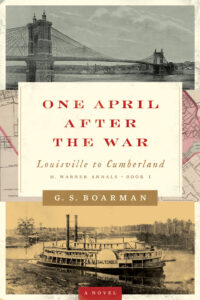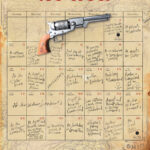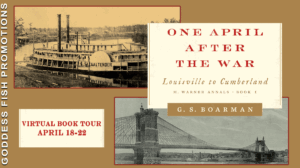 Novelist G.S. Boarman joins me today to chat about her new historical fiction, One April After the War: Louisville to Cumberland (Book I in M. Warner Annals series).
Novelist G.S. Boarman joins me today to chat about her new historical fiction, One April After the War: Louisville to Cumberland (Book I in M. Warner Annals series).
During the virtual book tour, G.S. will be awarding a $10 Amazon or Barnes and Noble (winner’s choice) gift card to a lucky randomly drawn winner. To be entered for a chance to win, use the form below. To increase your chances of winning, feel free to visit the other tour stops and enter there, too!
Welcome, G.S., please tell us a little bit about yourself.
GS Boarman is my pen name. Boarman is the ancient family name on my paternal grandmother’s side. My mother once gave me a book on the Boarman family ancestry, but I had never heard of the Boarmans before. It proved to be a very interesting book to read. Major William Boarman received at least 4000 acres of land in the colony of Maryland in the late 1600s, in consequence of some connection to the Calvert family whose head was Lord Baltimore. The Major married three times, siring 12 children (7 daughters and 6 sons). Major Boarman was unusual for his time in that he bequeathed even to his daughters decent parcels of land (400-500 acres each), bucking the entrenched English policy of primogeniture that dictated that all land be bequeathed to the firstborn son. Over the generations, all that acreage was divided and subdivided between the many descendants. The Boarmans spread out to the colony of Virginia and then into the then-county of Kentucky, where my family has lived for several generations now. My great-grandmother was a Boarman, and she married a Hughes. (I used Hughes for the name of the engineer of the private train in the books). As I researched the different towns along the route my characters would take, I came across one of the Boarman descendants, Commodore Charles Boarman, whose naval career began in the War of 1812 and extended past the Civil War, a 68-year career. He launched Commodore Perry’s expedition to Japan. It was the discovery of Commodore Boarman, living in retirement in Martinsburg, WV (central to events in Book III) that decided for me my penname. G and S are the initials of my children. I have modeled the Warner family after Commodore Boarman’s family – seven sons and six daughters.
I have always loved reading, but I really appreciate those books that require not only thought, but a little research as well; I appreciate being challenged to learn. Writing just became an extension of reading as I learned to read critically and then to translate that critical reading to an objective response (usually for a term paper or essay); even now, whenever I read, I find myself forming essay-like critiques in my mind.
I have one dog, two cats (Ygraine and Molly), and three turtles (River, found just out of the shell, and Dennis and Dipper). My older daughter also has a corn snake. Until two years ago, there were four dogs (a true pack) – three males and one female. I named our girl Lally (same as the main character in my books) and the boys were named by my daughters: Jack and Morty (litter mates) and Fry (after Philip J. Fry from Futurama; litter mate to Lally). Together, they were Lally and the Boys.
My rival passion to writing is gardening or, more accurately, landscaping (I have completely changed the elevations in my yard, built retaining walls, dug out a pond and another water feature that we call the canal, and created rooms throughout the yard). Gardening and writing are perfect complimentary passions since landscaping can only be done (as far as my tolerance to cold is concerned) during the warmer months. When it is too cold or rainy to work outside, I take up writing (and the research that goes with it).
Please tell us about your current release.
One April After the War is the first in a series of projected 12 books, covering the decade 1870-1880. The first three books – One April After the War: Louisville to Cumberland, One April After the War: Cumberland to Washington, and The Will of the Turntable: The Way Home – cover the year 1870. I consider these three books to be a single unit, the inaugural story to the series.
What inspired you to write this book?
There were three separate events, occurring years apart, that eventually coalesced into the idea for a book, which then developed into a series of books. They are, in chronological order:
- My mother told me long ago, before she passed, that she had bought a book that traced the ancestry of our family. I thought she had been taken in by some charlatan. Our Uncle Bobby was the family historian, and this book didn’t come from him. But I was indeed able to trace our family history through my father’s mother. As I got closer to our time, I noticed that there were a lot of Mary’s in each family; often several sisters were named Mary and apparently “went” by their middle names. One such Mary stood out to me. She was one of my paternal grandmother’s cousins, with several sisters named Mary, but this Mary, whose middle name I will withhold for the time being, had noted off to the side “Lally.” I thought that was the sweetest nickname I had ever heard. I decided then and there, that if I ever wrote a book, my character would be Lally. (Those of you of a certain age may be able to guess her middle name, the diminutive of which is Lally.)
- My older daughter has endured a kind of cascade of emotional/behavioral challenges, beginning almost from day One. Severe separation anxiety lasted well into her teens; the problem was so severe, she would vomit and cry if I had to leave her. She did not sleep through the night until she was 11 years old. But the real problems began in third grade when she suddenly had trouble with schoolwork, where before she had shone. The next year I began home-schooling her and her younger sister. She is incredibly smart – plays the piano by ear, has dabbled with the violin and guitar, can draw with the same accuracy as a camera takes a picture, writes, and has taken up painting. But getting her to do her homework was like pulling teeth; she just could not focus to do it. Finally, at age 17, she was diagnosed with ADD. By this time, she was just done with doctors and counsellors and perceived failures and disappointing medications, and she just broke down one day and asked why this happened to her. Among other things, I said to think of the children whose parents could not afford the testing or the medication or even had the resources to research the problem. Then I said, “Think about the children who had this problem before anyone had a name for it.” It made me research the history of ADD.
- My younger daughter asked me what the Secret Service did. I am ashamed to say that I knew nothing more than that they protected the President. It made me research the Secret Service, and then counterfeiting.
Almost like a thunderclap, everything came together, and I had the germ of a story. After that it was research, research, research.
Excerpt from One April After the War:
Excerpts for all three books may be found on my website, but here is a different excerpt:
It was as they were in the private rooms the District Attorney kept at the Burnet Hotel (so conveniently located next to the Post-Office Building wherein were housed the United States courts), quietly sipping the attorney’s private stock of whiskey – private, because it was Kentucky bourbon and not the native and therefor more patriotic Cincinnati whiskey so reviled in Louisville – that another courier brought to them another note. Argent remarked a little condescendingly as he accepted the note, “Miss Warner probably intends to hold us exactly to the twenty-four-hour extension she granted us.” The mild curiosity on his face quickly transmogrified into alarm and even terror as he read the note.
Merritt carefully placed his unfinished drink on the desk. “What is in the note? Is it from M?”
“No,” Argent breathed, but Merritt wasn’t sure if it was in answer to his question or in response to the contents of the note. “No,” Argent repeated more forcefully, then, “No, no, no.” Argent had risen from his seat as he said this, and Merritt followed him to his feet. Argent left without a word, leaving Merritt to excuse both himself and Argent from the attorney’s hospitality.
Argent was striding ahead of Merritt, heedless of the looks as he brusquely pushed passed people in his path. Merritt hurried to catch up with Argent, asking, “Shall I hail a carriage?”
Argent never slowed in his pace or softened in his determination to shoulder past the other pedestrians. Merritt often had to step behind Argent to avoid toppling on-coming passersby into the street. Finally, there was an opening in the sidewalk traffic, and Merritt was able to walk abreast of Argent and hear the news.
“This note,” Argent said between gritted teeth and fiercely waving the note at Merritt, “this note was written more than three hours ago, and it was just now delivered to us.” Merritt retrieved the note from Argent’s angry waves and read it as Argent simultaneously explained its content. “Miss Warner was arrested nearly four hours ago for disorderly conduct and indecent exposure.”
Merritt rarely expressed real surprise or astonishment, but in this instance, he repeated rather loudly, “Indecent exposure?!” earning him suspicious looks from several passersby. Lowering his voice, he said, “There must be some mistake. M can hardly bring herself to speak to other people, much less engage in lewd behavior.”
“No, I can’t believe it of her, either; but she has been in custody these four hours, and according to that note, she was due to be transferred to the workhouse an hour ago, if she could not find the means to pay her bail.”
“And her baggage wherein she keeps her money is at Scott’s Landing.”
“As are our own.” They had elected to deceive M into staying ever longer in Cincinnati by feigning problems with the luggage retrieval. The truth was that, other than the locked trunk with its evidence, they had never requested the return of their baggage (though they had insisted on its security), certain they could still get Miss Warner on the M&C and on their way to Washington. They (and M) had been living out of their grip bags ever since. Their deceit was coming back around to trip them. “Hopefully between us we can manage her bail and get her out of there. If she has not already been sent ahead to the workhouse.”
“The Workhouse.” Though they were striding at a very fast pace, Merritt managed to say the ominous words slowly. The wind blew dust and grit into his mouth and eyes. Merritt now understood Argent’s repeated ‘no’ – someone with M’s pride would find the shame and humiliation unbearable – almost anyone would. And Merritt saw a great cascade of repercussions for her in Louisville from such ignominy – the event, of course, would be printed in the papers; and certainly, least of all for themselves, her quite understandable desire to return home, and never, never leave again.
Argent said, “She will never forgive us for taking so long to come to her aid.”
What exciting story are you working on next?
The first three books of the series are finished; I am working on Book IV in the series, as yet untitled.
When did you first consider yourself a writer?
It didn’t become real to me until I saw the book covers. I think I started to really consider that I might be a writer after I wrote my first scene with dialogue. I was confident that I could write narrative, but I had never attempted dialogue before. I cannot say objectively to what degree I succeeded, but at least I got through it and put something down on paper.
Do you write full-time? If so, what’s your work day like? If not, what do you do other than write and how do you find time to write?
Up until recently, I wrote full time, but that may change, depending on circumstances. When I am not writing, I am working in the yard, except in the coldest months of winter. There is always weeding to do, but I also move a great deal of mulch each spring and plant quite a few annuals and divide the perennials. I have just about run out of places in the yard to landscape, but once that happens, it will be time to go back to the beginning and begin making renovations.
What would you say is your interesting writing quirk?
When I find the solution to a particularly difficult problem in the plot, I often share my excitement with my dogs (now, sadly, one dog).
As a child, what did you want to be when you grew up?
I have always wanted to write but never had any idea what I should write. Short of being a writer, I thought it would be interesting to do research for other people.
 Anything additional you want to share with the readers?
Anything additional you want to share with the readers?
I realized a few months ago that April of 1870 (the time of the first three books) is exactly mirrored in April 2022: in both years April starts on a Friday and Easter is on April 17, and the full moon is off only by one day. I have appended a calendar designed specifically for this first book.
Links:
Website


Thank you for sharing your interview and book details and for offering a giveaway, I have enjoyed reading about you and your work and I am looking forward to reading your book, it sounds excellent
Thanks for hosting!
I liked the excerpt, sounds like a good read.
Great interview
Great excerpt and giveaway.
Sounds like a fantastic read!
Thanks for the great excerpt! I’ve put this on my reading list.
nice interview